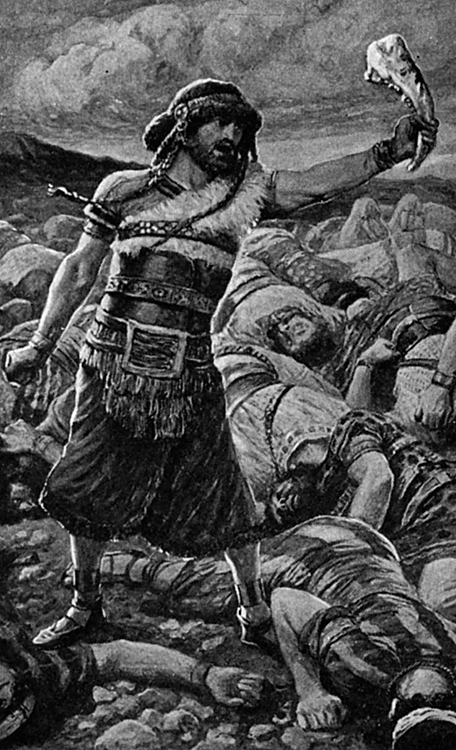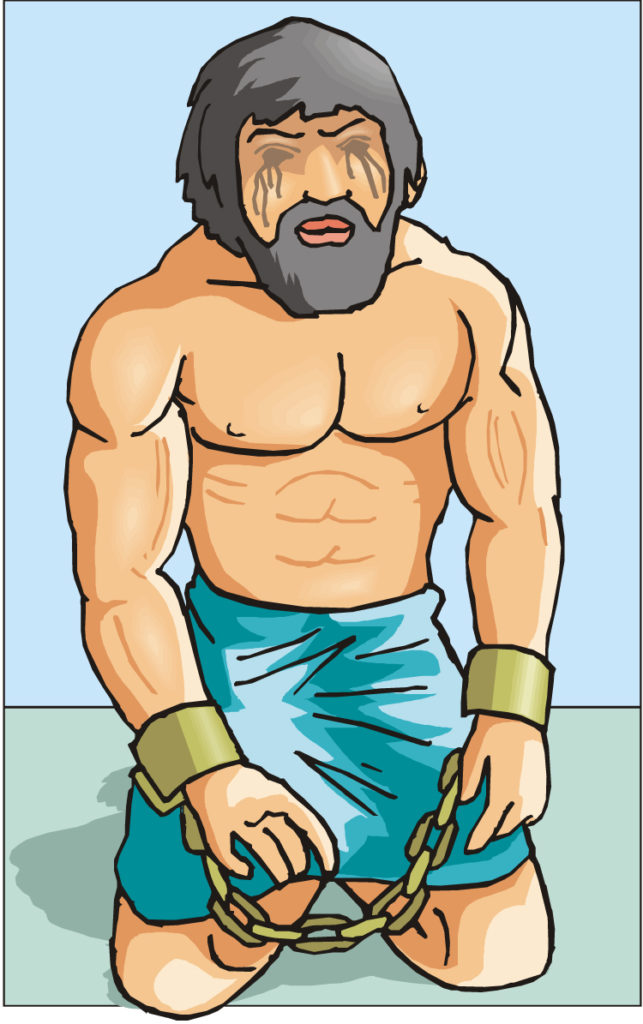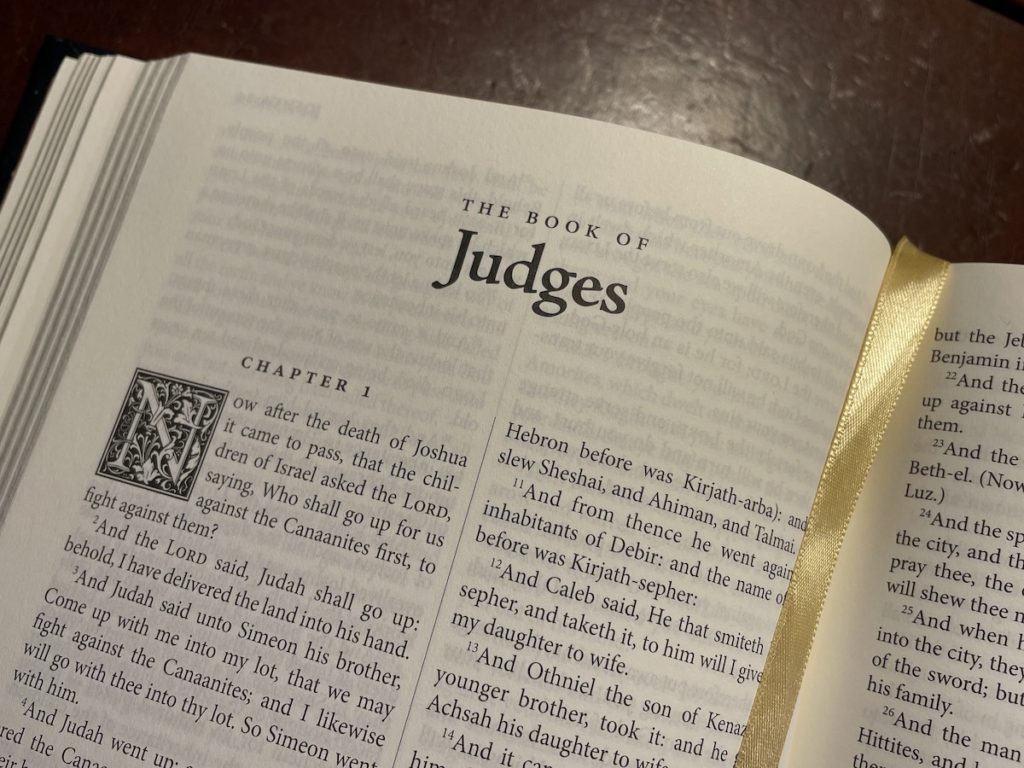Judges 14

Judges 14:8–9, Honey out of the carcass. Although Samson’s parents followed the Messenger of YHVH’s instructions and dedicated him as a Nazarite (Judg 13:5), Samson was not a totally committed to his divine calling as a Nazarite; he played around the edges of obedience with regard to the Torah’s strictures with regard to the requirements to be a Nazarite (Num 6:1–22).
An example of Samson’s careless approach to being a Nazarite includes his touching a dead lion carcass, and spending time in the Valley of Sorek (or grapevine), where he fell under the sway of Delilah (Judg 16:4ff). A Nazarite was to get nowhere near either a dead carcass or grape products (Num 6:3, 6). This teaches us two things. Samson’s parents chose his religion for him and dedicated him to YHVH’s service, and he begrudgingly went along with it, but he did not fully own his parents’ vision for his life; it was not his choice. The lesson here is that parents can raise their children correctly, but it is up to each child to embrace and then walk in the path they have set before them. Whether they do or do not, it is up to them to do so, and they will be blessed or cursed accordingly.
The second lesson is that because Samson had not fully embraced his divine calling as a lifelong Nazarite, he played around the edges of sin. Eventually, the sin sucked him into its maw, and we fell spiritually and suffered the resultant consequences of his bad choices. When we know to do right by giving sin and temptation a wide berth, we will be less likely to be drawn away and to fall to it. Samson failed to do this and the consequences for his life were disastrous. James the apostle has something to say about this.
Blessed is the man who endures temptation; for when he has been approved, he will receive the crown of life which the Lord has promised to those who love Him. Let no one say when he is tempted, “I am tempted by Elohim”; for Elohim cannot be tempted by evil, nor does He Himself tempt anyone. But each one is tempted when he is drawn away by his own desires and enticed. Then, when desire has conceived, it gives birth to sin; and sin, when it is full-grown, brings forth death. (Jas 1:12–15)
Sadly, in many respects, Samson was a lover of this world more than a lover of Elohim. Because of his lust for women and giving in to the carnal desires of the flesh, his weakness resulted in his ignominious fall. Again James warns us,

Adulterers and adulteresses! Do you not know that friendship with the world is enmity with Elohim? Whoever therefore wants to be a friend of the world makes himself an enemy of Elohim. Or do you think that the Scripture says in vain, “The Spirit who dwells in us yearns jealously”? But He gives more grace. Therefore He says: “ELOHIM RESISTS THE PROUD, BUT GIVES GRACE TO THE HUMBLE.” Therefore submit to Elohim. Resist the devil and he will flee from you. Draw near to Elohim and He will draw near to you. Cleanse your hands, you sinners; and purify your hearts, you double-minded. (Jas 4:4–8)
Despite Samson’s carnal weaknesses and spiritual failures, he was still given a place of recognition in the Scriptures’ “Hall of Faith” in Hebrews chapter eleven (Heb 11:32). This speaks volumes about YHVH’s mercy and grace for those who act valiantly in service to his kingdom despite their weaknesses. James, again, speaks to us in this regard,
[Elohim’s] mercy triumphs over judgment. (Jas 3:13 cp. Pss 85:10; 89:14)
Judges 15

Judges 15:15, Jawbone of a donkey. Samson exercised resourcefulness and ingenuity and used what was at hand to fulfill is divine mission and purpose. In this case, he used the jawbone of a donkey to slay 1,000 Philistines, who were the enemies of Israel and the illegal inhabitants of the land that Elohim had given to the Israelites. We learn from this that if we want to be a profitable servant of Elohim, we can use anything at our disposal to help advance his kingdom. How many times have you heard someone say, I were rich, or if I won the lottery, then I would do such and such for the Lord? Frankly, this is often a cop out to excuse one’s failure in fulfilling one’s Christian duties and responsibilities to help advance the kingdom of Elohim. Such a person is actually burying their talents in the sand and is an unprofitable servant. No! Rather, what can YOU do NOW with the time, resources and abilities that you already available to you to “slay” the enemies of YHVH and to advance his kingdom?
Judges 16

Judges 16:20, YHVH had departed from him. This was a sad day in Samson’s life. How the mighty have fallen! Samson’s departure from YHVH was a slow and gradual process until found himself in a place of total compromise resulting in darkness and sin. YHVH had no choice but to abandon Samson, for he had totally given himself over to the world, flesh and devil. What’s sadder is that Samson was so compromised that he did not even know that YHVH had departed from him. He as that out of tune spiritually with YHVH that he had totally lost touch. This did not happen overnight. You see, people don’t just decide one day to abandon Elohim all at once. They little-by-little fall into sin and one thing leads to another until they are in total darkness. This is where Samson found himself very quickly, literally.
Judges 16:21, Out his eyes. Having fallen away from YHVH because he had given himself over to the love of the world, the flesh and the devil, Samson was now in a place of both physical and spiritual darkness. Long before losing his physical eyesight, he had already lost his spiritual eyesight. His physical condition of blindness was a result of his spiritual blindness. One’s physical state often mirrors one’s spiritual state. Not only that, Samson was now a prisoner and a slave to the false gods of this world to which he had prostrated himself. Anything that we give our lives over to other than Yeshua the Messiah will rise up and capture and then enslave us, and this will lead to our death, as Samson sadly was about to find out.

Judges 16:30, Let me die. Self-Murder (Suicide) or Self-Sacrifice Out of Love? Was Samson’s death a suicide, which is self-murder—something the Torah implicitly forbids? Let’s answer this question with a question. Was Yeshua going to certain death on a cross a form of suicide as well, or was it self-sacrifice to serve a greater spiritual purpose, that is, laying one’s life down for his friends (there is no greater love, John 15:13; cp. Rom 5:7)? In battle, if a soldier throws himself upon a grenade to save is comrades, is that suicide or self-sacrifice for a higher purpose? If someone goes into a burning house to save someone and loses his his own life in the process, is this suicide or laying one’s life down for a higher purpose? I suggest that we think of Samson’s “suicide” in the same way.





